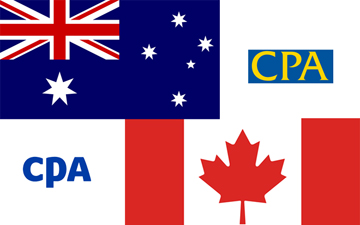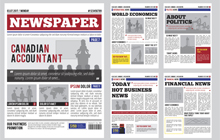PwC Australia ethics breach: Differences in Canadian and Australian CPA regulation

Though similiar, there are important differences between Australian and Canadian professional rules of conduct explains accounting professor George Gonzalez
 |
George Gonzalez, PhD is Associate Professor at the Calgary campus of the University of Lethbridge. He is a Chartered Professional Accountant (CPA, CA, Ontario) and a Certified Public Accountant (CPA, Florida). |
THE PwC Australia tax consulting scandal that broke last year has provided, and continues to provide, rich material for journalists and commentators.
At the heart of the story is a tax partner’s violation of a confidentiality agreement that he signed for his client the Australian government. The partner shared confidential information that he had obtained in client meetings with other firm tax staff within and outside Australia. Those staff, in turn, used the information to recruit prospects and clients to avoid imminent tax laws that the PwC Australia partner was helping the government develop.
Learning of the confidentiality breach, the Tax Practitioners Board (TPB) conducted an investigation that led to its finding that the PwC partner violated the Integrity principle of the Code of Professional Conduct. The TPB terminated the partner’s tax agent registration. It also determined that PwC had breached its obligations under the Code of Professional Conduct and failed to properly manage conflicts of interest.
The Australian Senate has held its own investigation into the matter. A great deal of the details of the case that have been reported have been provided through the Senate’s publication of testimony from its hearings.
Substantial negative consequences for the firm and its partners have followed since the scandal broke, and it appears that fallout is continuing.
Reports on the case have generally focused on the facts and commentary on implications for the accounting profession. This article’s angle is to examine, from a Canadian perspective, the professional conduct rules that Australian regulators have found to have been violated.
Canadian CPA Professional Conduct Rules
Chartered Professional Accountants receive their designation and licensing from their province, and it is the province that sets forth the regulatory rules of conduct by which CPAs must abide. When the accounting bodies were merged about ten years ago, one of CPA Canada’s goals was to have a uniform set of professional rules of conduct that all provincial CPA bodies would require of its members. (Although provinces were allowed to make minor deviations to the rules, so as to customize the rules for its unique membership.)
Representative of the uniform set of rules of conduct established by CPA Canada is CPA Ontario’s Code of Professional Conduct and Student Code. The five fundamental principles of ethics under the Code are: (1) Professional Behaviour; (2) Integrity and Due Care; (3) Objectivity; (4) Professional Competence; and (5) Confidentiality.
(While CPA Ontario and CPA Quebec are terminating their relationship with CPA Canada, to date their professional conduct codes have not changed.)
If the PwC Australia situation had happened in Canada, of the five aforementioned principles the two that would likely be most pertinent are (1) Professional Behaviour and (2) Confidentiality.
Professional Behaviour
Chartered Professional Accountants conduct themselves at all times in a manner which will maintain the good reputation of the profession and serve the public interest.
Confidentiality
Chartered Professional Accountants protect confidential information acquired as a result of professional, employment and business relationships and do not disclose it without proper and specific authority, nor do they exploit such information for their personal advantage or the advantage of a third party.
Based on the facts of the PwC Australia that we know, if those same facts were applied in Canada, it seems clear that the first principle would have been breached, and perhaps likely the second principle as well.
As discussed momentarily, the Australian CPA profession has a set of conduct rules similar to Canada’s. Interestingly, however, when they are applied to the PwC Australia case, only one of the two equivalent conduct rules, the one corresponding to our Professional Behaviour principle, was deemed to have been violated. Application of the Australian principle of Confidentiality, with language different from that of Canada’s, did not lead the regulators to the conclusion that there was a violation of this principle. More on this later.
Australian CPA Professional Conduct Rules: CPA Australia and the APESB
Certified Practising Accountants are subject to the professional codes of conduct of the national body, CPA Australia, and by extension to the Accounting Professional and Ethical Standards Board (APESB), which apply to CPAs in Australia and New Zealand. Among these standards is APES 110 Code of Ethics for Professional Accountants, which includes: Section 112 Objectivity; Section 113 Professional Competence and Due Care; and Section 114 Confidentiality. These are all quite similar to the Canadian standards referred to above.
Australian CPA Professional Conduct Rules: Tax Practitioners Board
In Australia, a CPA who practises tax is subject to the regulatory rules imposed by Australian legislation called the Tax Agents Services Act 2009. Any professional who charges a fee for tax advice (whether a CPA or a non-CPA) must register with the Tax Practitioners Board (TPB), which enforces the Tax Agents Services Act 2009.
The TPB’s web site states that the Board “is a national body responsible for the registration and regulation of tax agents and BAS agents (collectively referred to as 'tax practitioners'). The TPB is also responsible for ensuring compliance with the Tax Agent Services Act 2009 (TASA), including the Code of Professional Conduct (Code).”
Thus, a CPA tax practitioner in Australia must follow the codes of conduct set forth by both CPA Australia and the TPB. For CPA tax practitioners, it is the TPB that has the bigger and sharper teeth. Having one’s TPB registration canceled means it would be illegal to continue practicing tax. As stated at the beginning of this article, one piece of fallout from the PwC Australia case is that the tax partner was found to have violated the Integrity principle, and consequently had their tax registration terminated by the TPB.
A Closer Look at Which Ethical Rules Were Violated
The TPB’s Code of Professional Conduct segregates its principles into these categories: (1) Honesty and integrity; (2) Independence; (3) Confidentiality; (4) Competence and (5) Other responsibilities. The TPB’s summary text of the first and third one follow.
Rule #1 (Honesty and Integrity) includes: “You must act honestly and with integrity.”
The terms 'honesty' and 'integrity' are not defined in the TASA, but guidance can be obtained from Australian court decisions, which have held that honesty and integrity include:
- acting with good morals and without depravity;
- acting properly and without deceit;
- acting without intent to gain an improper benefit or advantage for himself, herself or for another
Regarding Rule #3 (Confidentiality): “Unless you have a legal duty to do so, you must not disclose any information relating to a client’s affairs to a third party without your client’s permission.”
The TPB found that the PwC Australia partner violated the Integrity principle of Rule #1 by not acting with good morals, by not acting properly and without deceit, and by acting with intent to gain an improper benefit or advantage.
The TPB did not, however, also claim that the partner violated the Confidentiality principle of Rule #3. My interpretation is that, since the partner was found to have shared confidential with others within the firm, but not with outside parties, the TPB did not deem the partner to have violated the confidentiality principle.
Differences in Canadian and Australian CPA Regulation
A comparison of the actual PwC Australia case and a hypothetical case with the same facts in Canada leads to interesting observations.
One relates to the regulation of tax practice. In Australia, to practise tax (if a fee is charged), the practitioner must register with the Tax Practitioners Board (TPB), which was established by an Australia statute. In Canada, there is no regulatory body that is comparable to Australia’s TPB.
Some Canadian provinces (e.g., British Columbia) require a CPA member to obtain a licence to practise tax, while other provinces (e.g., Ontario) do not. In Canada, a non-CPA may practise tax without the need to be licensed. H&R Block Canada and its accountants, for example, provide non-CPA tax services and are not required to be licensed to practise tax. In Australia, on the other hand, any tax practitioner must register with the TPB, whether a CPA or other.
Another interesting observation is that, while the professional rules of conduct followed by Canadian CPA bodies are generally quite similar to those followed by CPA Australia and the Australian TPB, there is an important difference in the Confidentiality principle. This difference can be described as follows:
- Canada’s Confidentiality code holds that client confidential information may not be disclosed without proper and specific authority, nor may it be exploited for personal advantage or the advantage of a third party.
- The Australian TPB code prohibits the sharing of confidential client information with outside parties but, by implication, does not restrict the sharing of such information with other parties within the tax practitioner’s firm.
In the PwC Australia case, the TPB deemed the partner to have violated the professional code of conduct’s Integrity rule, but did not deem the Confidentiality rule to have been broken. In a hypothetical Canadian case with the same facts, it seems likely that the partner would have been deemed to have violated both the Professional Behaviour principle and the Confidentiality principle.
George Gonzalez, PhD is Associate Professor at the Calgary campus of the University of Lethbridge. He is a Chartered Professional Accountant (CPA, CA, Ontario) and a Certified Public Accountant (CPA, Florida).









(0) Comments